Detailed Report: Rule of Law, Human Rights Act Articles 8 & 10
VerifiedAdded on 2022/12/16
|6
|1421
|81
Report
AI Summary
This report provides an overview of the rule of law and the Human Rights Act within the context of the UK legal system. The report begins by defining the rule of law, discussing its core elements such as the abhorrence of arbitrary power, equality before the law, legal certainty, and due process. It highlights the importance of these elements in maintaining a fair and just society. The report then delves into the Human Rights Act, specifically focusing on Articles 8 and 10. Article 8, which concerns the right to private and family life, is examined in detail, including its scope and limitations, with reference to relevant case law. Article 10, which addresses the freedom of expression, is also explored, including its restrictions. The report emphasizes that both rights are not absolute and are subject to certain limitations. The report concludes by summarizing the key principles of the rule of law and the fundamental rights enshrined in the Human Rights Act, underscoring their significance in the UK legal framework.
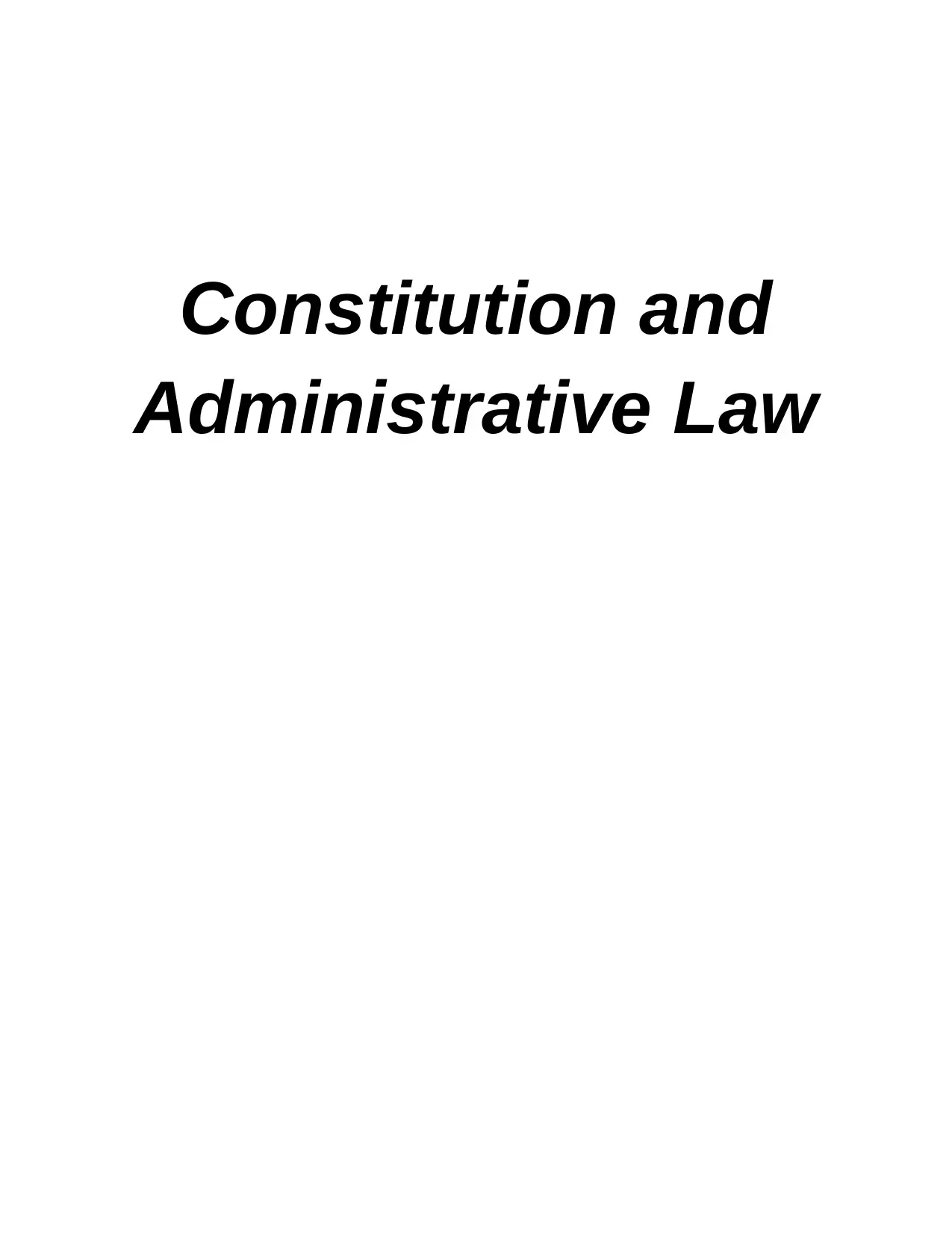
Constitution and
Administrative Law
Administrative Law
Paraphrase This Document
Need a fresh take? Get an instant paraphrase of this document with our AI Paraphraser
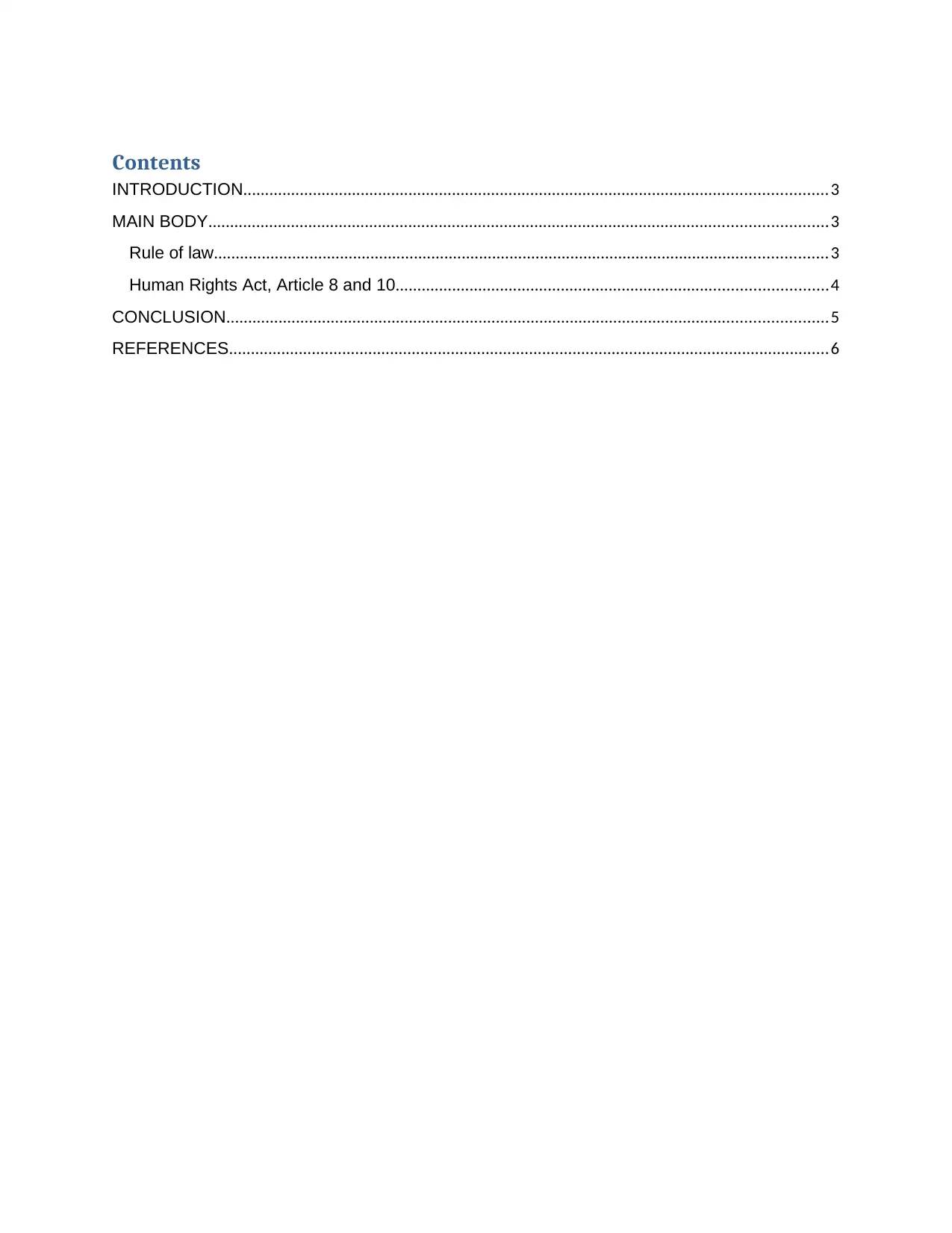
Contents
INTRODUCTION......................................................................................................................................3
MAIN BODY..............................................................................................................................................3
Rule of law.............................................................................................................................................3
Human Rights Act, Article 8 and 10...................................................................................................4
CONCLUSION..........................................................................................................................................5
REFERENCES..........................................................................................................................................6
INTRODUCTION......................................................................................................................................3
MAIN BODY..............................................................................................................................................3
Rule of law.............................................................................................................................................3
Human Rights Act, Article 8 and 10...................................................................................................4
CONCLUSION..........................................................................................................................................5
REFERENCES..........................................................................................................................................6
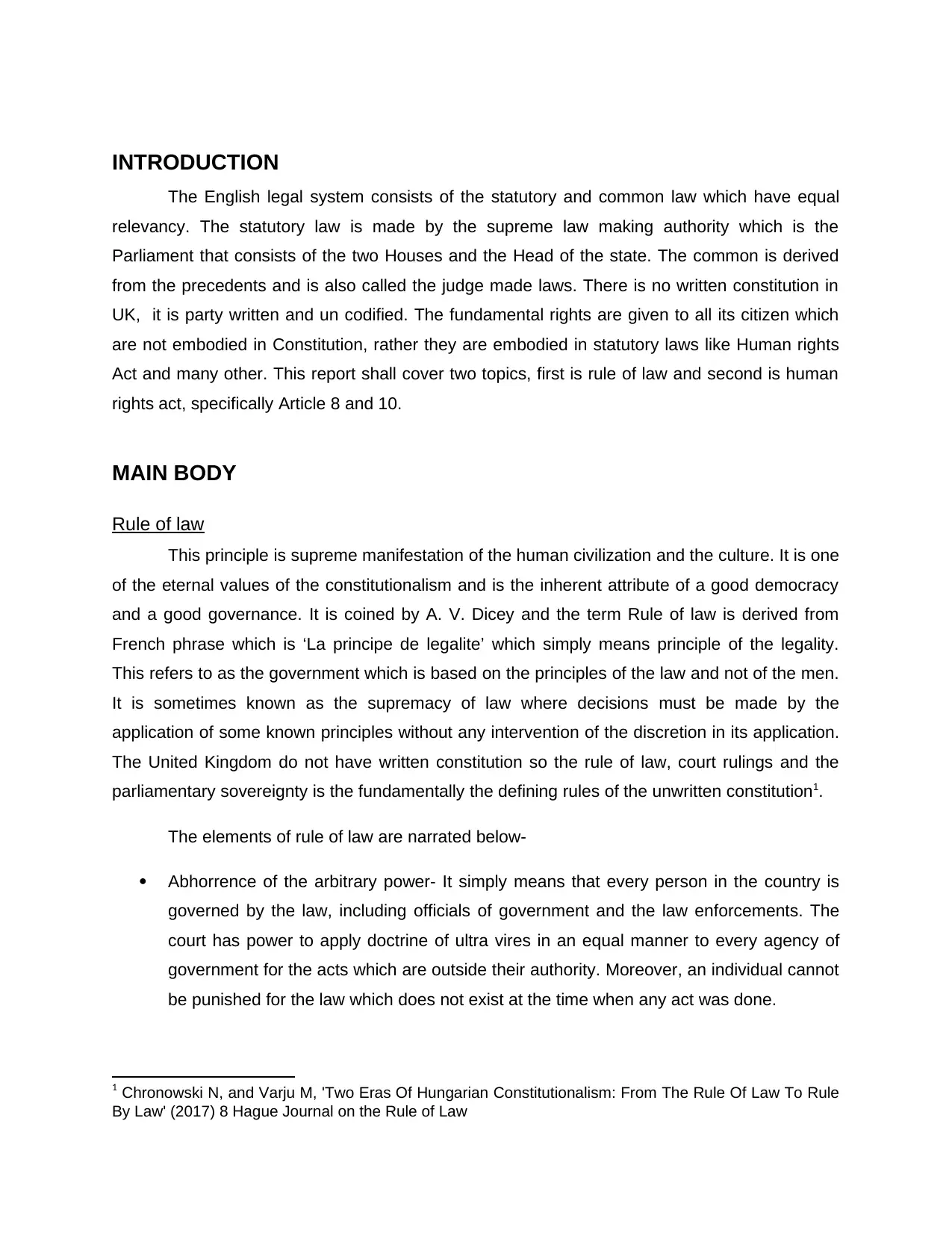
INTRODUCTION
The English legal system consists of the statutory and common law which have equal
relevancy. The statutory law is made by the supreme law making authority which is the
Parliament that consists of the two Houses and the Head of the state. The common is derived
from the precedents and is also called the judge made laws. There is no written constitution in
UK, it is party written and un codified. The fundamental rights are given to all its citizen which
are not embodied in Constitution, rather they are embodied in statutory laws like Human rights
Act and many other. This report shall cover two topics, first is rule of law and second is human
rights act, specifically Article 8 and 10.
MAIN BODY
Rule of law
This principle is supreme manifestation of the human civilization and the culture. It is one
of the eternal values of the constitutionalism and is the inherent attribute of a good democracy
and a good governance. It is coined by A. V. Dicey and the term Rule of law is derived from
French phrase which is ‘La principe de legalite’ which simply means principle of the legality.
This refers to as the government which is based on the principles of the law and not of the men.
It is sometimes known as the supremacy of law where decisions must be made by the
application of some known principles without any intervention of the discretion in its application.
The United Kingdom do not have written constitution so the rule of law, court rulings and the
parliamentary sovereignty is the fundamentally the defining rules of the unwritten constitution1.
The elements of rule of law are narrated below-
Abhorrence of the arbitrary power- It simply means that every person in the country is
governed by the law, including officials of government and the law enforcements. The
court has power to apply doctrine of ultra vires in an equal manner to every agency of
government for the acts which are outside their authority. Moreover, an individual cannot
be punished for the law which does not exist at the time when any act was done.
1 Chronowski N, and Varju M, 'Two Eras Of Hungarian Constitutionalism: From The Rule Of Law To Rule
By Law' (2017) 8 Hague Journal on the Rule of Law
The English legal system consists of the statutory and common law which have equal
relevancy. The statutory law is made by the supreme law making authority which is the
Parliament that consists of the two Houses and the Head of the state. The common is derived
from the precedents and is also called the judge made laws. There is no written constitution in
UK, it is party written and un codified. The fundamental rights are given to all its citizen which
are not embodied in Constitution, rather they are embodied in statutory laws like Human rights
Act and many other. This report shall cover two topics, first is rule of law and second is human
rights act, specifically Article 8 and 10.
MAIN BODY
Rule of law
This principle is supreme manifestation of the human civilization and the culture. It is one
of the eternal values of the constitutionalism and is the inherent attribute of a good democracy
and a good governance. It is coined by A. V. Dicey and the term Rule of law is derived from
French phrase which is ‘La principe de legalite’ which simply means principle of the legality.
This refers to as the government which is based on the principles of the law and not of the men.
It is sometimes known as the supremacy of law where decisions must be made by the
application of some known principles without any intervention of the discretion in its application.
The United Kingdom do not have written constitution so the rule of law, court rulings and the
parliamentary sovereignty is the fundamentally the defining rules of the unwritten constitution1.
The elements of rule of law are narrated below-
Abhorrence of the arbitrary power- It simply means that every person in the country is
governed by the law, including officials of government and the law enforcements. The
court has power to apply doctrine of ultra vires in an equal manner to every agency of
government for the acts which are outside their authority. Moreover, an individual cannot
be punished for the law which does not exist at the time when any act was done.
1 Chronowski N, and Varju M, 'Two Eras Of Hungarian Constitutionalism: From The Rule Of Law To Rule
By Law' (2017) 8 Hague Journal on the Rule of Law
⊘ This is a preview!⊘
Do you want full access?
Subscribe today to unlock all pages.

Trusted by 1+ million students worldwide
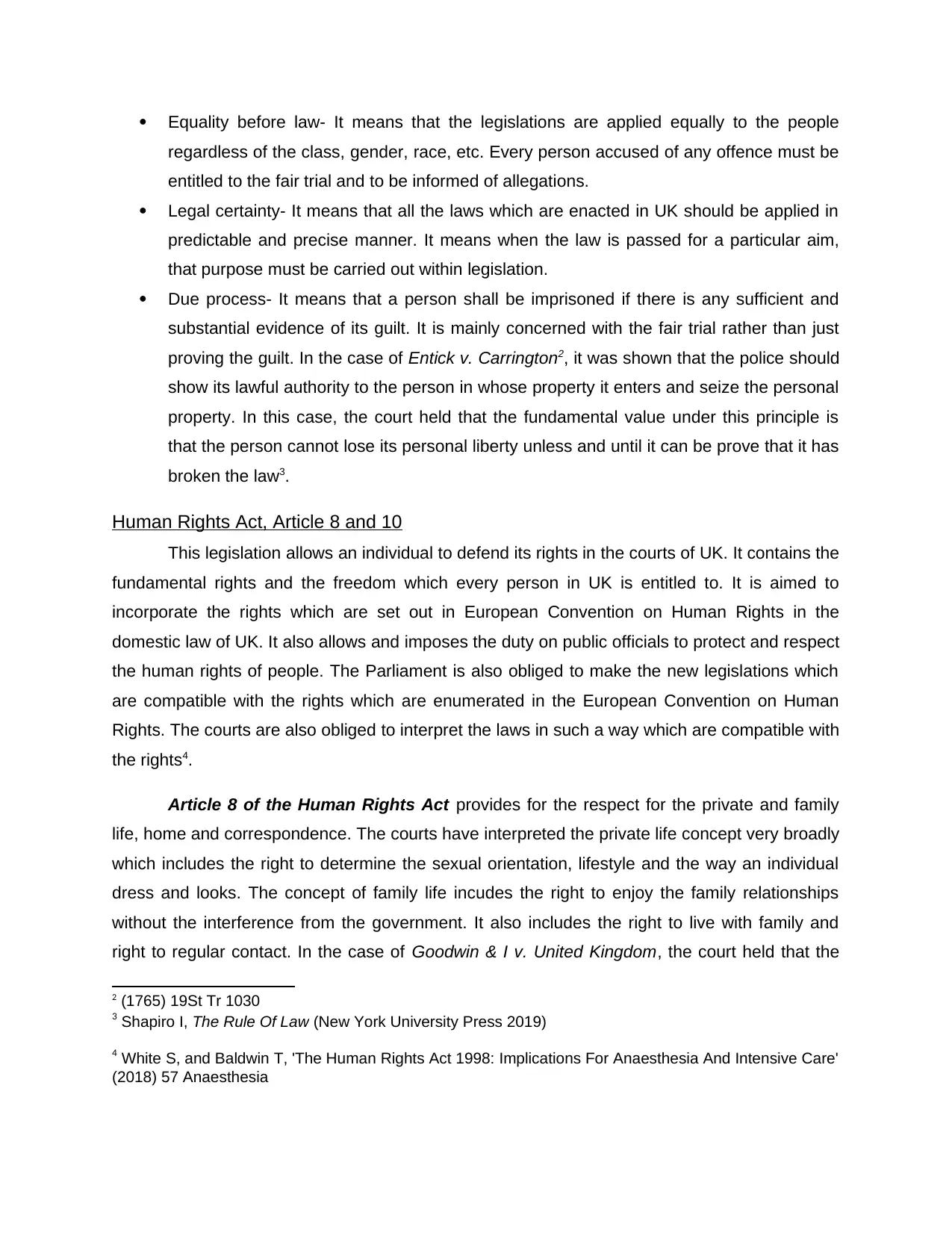
Equality before law- It means that the legislations are applied equally to the people
regardless of the class, gender, race, etc. Every person accused of any offence must be
entitled to the fair trial and to be informed of allegations.
Legal certainty- It means that all the laws which are enacted in UK should be applied in
predictable and precise manner. It means when the law is passed for a particular aim,
that purpose must be carried out within legislation.
Due process- It means that a person shall be imprisoned if there is any sufficient and
substantial evidence of its guilt. It is mainly concerned with the fair trial rather than just
proving the guilt. In the case of Entick v. Carrington2, it was shown that the police should
show its lawful authority to the person in whose property it enters and seize the personal
property. In this case, the court held that the fundamental value under this principle is
that the person cannot lose its personal liberty unless and until it can be prove that it has
broken the law3.
Human Rights Act, Article 8 and 10
This legislation allows an individual to defend its rights in the courts of UK. It contains the
fundamental rights and the freedom which every person in UK is entitled to. It is aimed to
incorporate the rights which are set out in European Convention on Human Rights in the
domestic law of UK. It also allows and imposes the duty on public officials to protect and respect
the human rights of people. The Parliament is also obliged to make the new legislations which
are compatible with the rights which are enumerated in the European Convention on Human
Rights. The courts are also obliged to interpret the laws in such a way which are compatible with
the rights4.
Article 8 of the Human Rights Act provides for the respect for the private and family
life, home and correspondence. The courts have interpreted the private life concept very broadly
which includes the right to determine the sexual orientation, lifestyle and the way an individual
dress and looks. The concept of family life incudes the right to enjoy the family relationships
without the interference from the government. It also includes the right to live with family and
right to regular contact. In the case of Goodwin & I v. United Kingdom, the court held that the
2 (1765) 19St Tr 1030
3 Shapiro I, The Rule Of Law (New York University Press 2019)
4 White S, and Baldwin T, 'The Human Rights Act 1998: Implications For Anaesthesia And Intensive Care'
(2018) 57 Anaesthesia
regardless of the class, gender, race, etc. Every person accused of any offence must be
entitled to the fair trial and to be informed of allegations.
Legal certainty- It means that all the laws which are enacted in UK should be applied in
predictable and precise manner. It means when the law is passed for a particular aim,
that purpose must be carried out within legislation.
Due process- It means that a person shall be imprisoned if there is any sufficient and
substantial evidence of its guilt. It is mainly concerned with the fair trial rather than just
proving the guilt. In the case of Entick v. Carrington2, it was shown that the police should
show its lawful authority to the person in whose property it enters and seize the personal
property. In this case, the court held that the fundamental value under this principle is
that the person cannot lose its personal liberty unless and until it can be prove that it has
broken the law3.
Human Rights Act, Article 8 and 10
This legislation allows an individual to defend its rights in the courts of UK. It contains the
fundamental rights and the freedom which every person in UK is entitled to. It is aimed to
incorporate the rights which are set out in European Convention on Human Rights in the
domestic law of UK. It also allows and imposes the duty on public officials to protect and respect
the human rights of people. The Parliament is also obliged to make the new legislations which
are compatible with the rights which are enumerated in the European Convention on Human
Rights. The courts are also obliged to interpret the laws in such a way which are compatible with
the rights4.
Article 8 of the Human Rights Act provides for the respect for the private and family
life, home and correspondence. The courts have interpreted the private life concept very broadly
which includes the right to determine the sexual orientation, lifestyle and the way an individual
dress and looks. The concept of family life incudes the right to enjoy the family relationships
without the interference from the government. It also includes the right to live with family and
right to regular contact. In the case of Goodwin & I v. United Kingdom, the court held that the
2 (1765) 19St Tr 1030
3 Shapiro I, The Rule Of Law (New York University Press 2019)
4 White S, and Baldwin T, 'The Human Rights Act 1998: Implications For Anaesthesia And Intensive Care'
(2018) 57 Anaesthesia
Paraphrase This Document
Need a fresh take? Get an instant paraphrase of this document with our AI Paraphraser
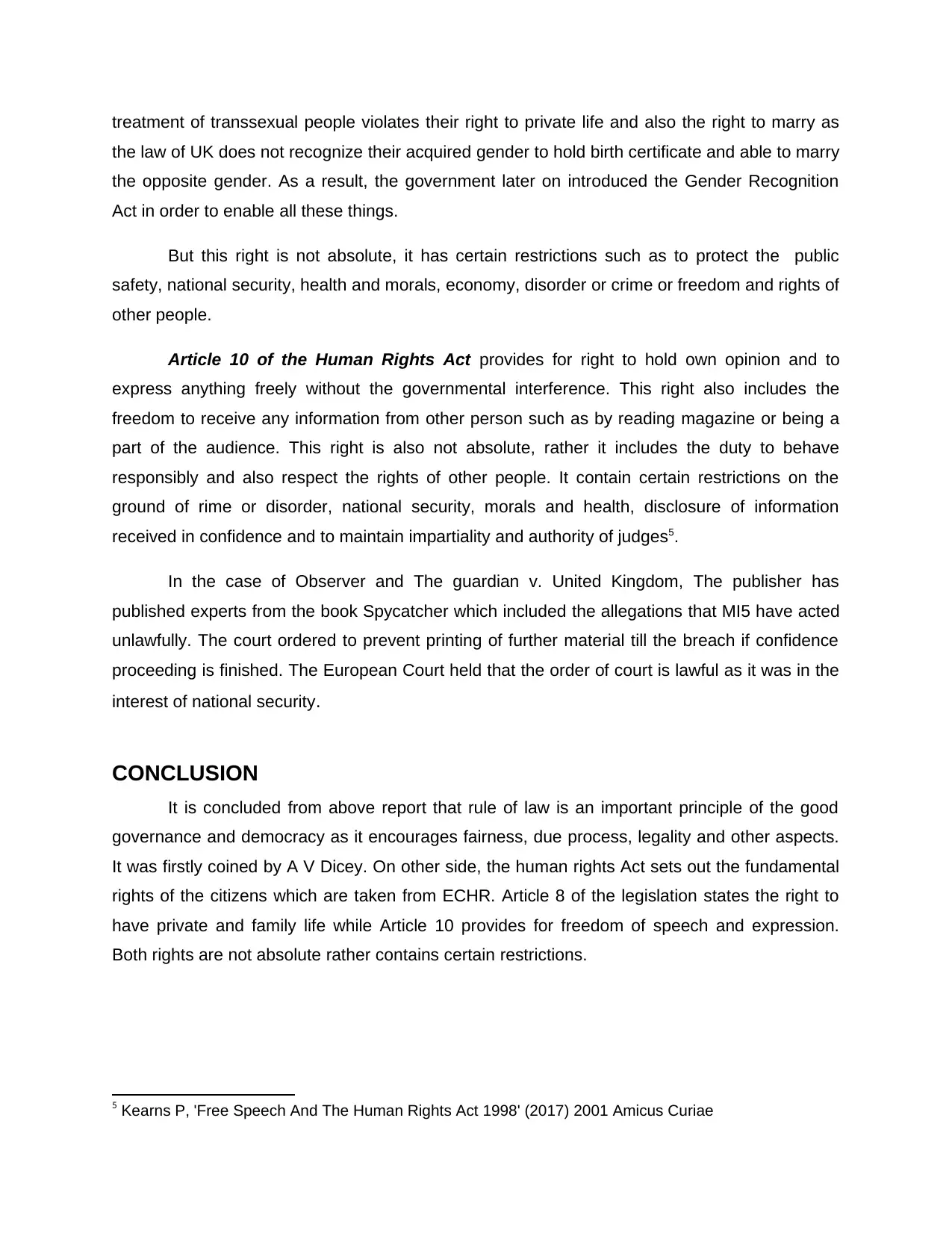
treatment of transsexual people violates their right to private life and also the right to marry as
the law of UK does not recognize their acquired gender to hold birth certificate and able to marry
the opposite gender. As a result, the government later on introduced the Gender Recognition
Act in order to enable all these things.
But this right is not absolute, it has certain restrictions such as to protect the public
safety, national security, health and morals, economy, disorder or crime or freedom and rights of
other people.
Article 10 of the Human Rights Act provides for right to hold own opinion and to
express anything freely without the governmental interference. This right also includes the
freedom to receive any information from other person such as by reading magazine or being a
part of the audience. This right is also not absolute, rather it includes the duty to behave
responsibly and also respect the rights of other people. It contain certain restrictions on the
ground of rime or disorder, national security, morals and health, disclosure of information
received in confidence and to maintain impartiality and authority of judges5.
In the case of Observer and The guardian v. United Kingdom, The publisher has
published experts from the book Spycatcher which included the allegations that MI5 have acted
unlawfully. The court ordered to prevent printing of further material till the breach if confidence
proceeding is finished. The European Court held that the order of court is lawful as it was in the
interest of national security.
CONCLUSION
It is concluded from above report that rule of law is an important principle of the good
governance and democracy as it encourages fairness, due process, legality and other aspects.
It was firstly coined by A V Dicey. On other side, the human rights Act sets out the fundamental
rights of the citizens which are taken from ECHR. Article 8 of the legislation states the right to
have private and family life while Article 10 provides for freedom of speech and expression.
Both rights are not absolute rather contains certain restrictions.
5 Kearns P, 'Free Speech And The Human Rights Act 1998' (2017) 2001 Amicus Curiae
the law of UK does not recognize their acquired gender to hold birth certificate and able to marry
the opposite gender. As a result, the government later on introduced the Gender Recognition
Act in order to enable all these things.
But this right is not absolute, it has certain restrictions such as to protect the public
safety, national security, health and morals, economy, disorder or crime or freedom and rights of
other people.
Article 10 of the Human Rights Act provides for right to hold own opinion and to
express anything freely without the governmental interference. This right also includes the
freedom to receive any information from other person such as by reading magazine or being a
part of the audience. This right is also not absolute, rather it includes the duty to behave
responsibly and also respect the rights of other people. It contain certain restrictions on the
ground of rime or disorder, national security, morals and health, disclosure of information
received in confidence and to maintain impartiality and authority of judges5.
In the case of Observer and The guardian v. United Kingdom, The publisher has
published experts from the book Spycatcher which included the allegations that MI5 have acted
unlawfully. The court ordered to prevent printing of further material till the breach if confidence
proceeding is finished. The European Court held that the order of court is lawful as it was in the
interest of national security.
CONCLUSION
It is concluded from above report that rule of law is an important principle of the good
governance and democracy as it encourages fairness, due process, legality and other aspects.
It was firstly coined by A V Dicey. On other side, the human rights Act sets out the fundamental
rights of the citizens which are taken from ECHR. Article 8 of the legislation states the right to
have private and family life while Article 10 provides for freedom of speech and expression.
Both rights are not absolute rather contains certain restrictions.
5 Kearns P, 'Free Speech And The Human Rights Act 1998' (2017) 2001 Amicus Curiae
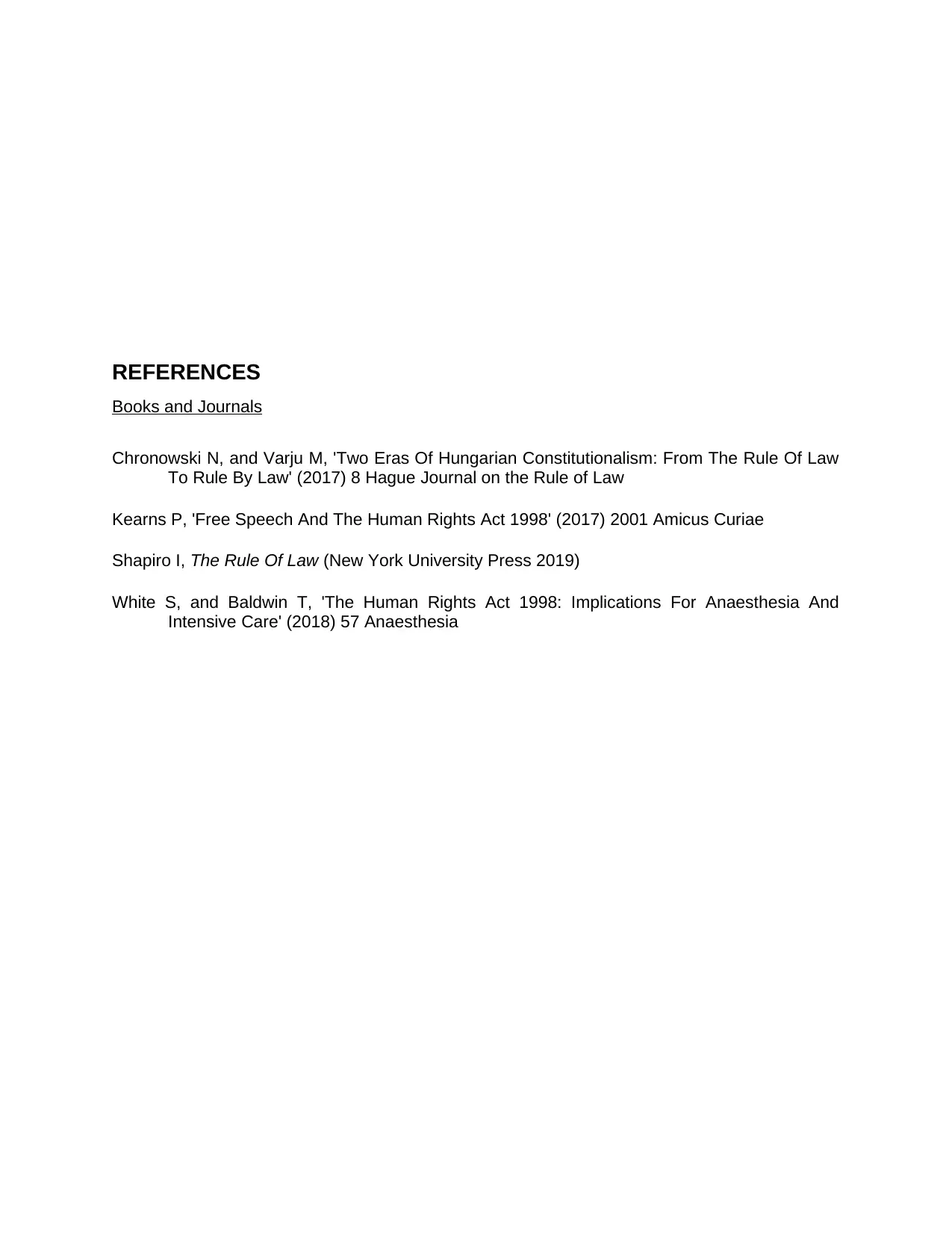
REFERENCES
Books and Journals
Chronowski N, and Varju M, 'Two Eras Of Hungarian Constitutionalism: From The Rule Of Law
To Rule By Law' (2017) 8 Hague Journal on the Rule of Law
Kearns P, 'Free Speech And The Human Rights Act 1998' (2017) 2001 Amicus Curiae
Shapiro I, The Rule Of Law (New York University Press 2019)
White S, and Baldwin T, 'The Human Rights Act 1998: Implications For Anaesthesia And
Intensive Care' (2018) 57 Anaesthesia
Books and Journals
Chronowski N, and Varju M, 'Two Eras Of Hungarian Constitutionalism: From The Rule Of Law
To Rule By Law' (2017) 8 Hague Journal on the Rule of Law
Kearns P, 'Free Speech And The Human Rights Act 1998' (2017) 2001 Amicus Curiae
Shapiro I, The Rule Of Law (New York University Press 2019)
White S, and Baldwin T, 'The Human Rights Act 1998: Implications For Anaesthesia And
Intensive Care' (2018) 57 Anaesthesia
⊘ This is a preview!⊘
Do you want full access?
Subscribe today to unlock all pages.

Trusted by 1+ million students worldwide
1 out of 6
Related Documents
Your All-in-One AI-Powered Toolkit for Academic Success.
+13062052269
info@desklib.com
Available 24*7 on WhatsApp / Email
![[object Object]](/_next/static/media/star-bottom.7253800d.svg)
Unlock your academic potential
Copyright © 2020–2026 A2Z Services. All Rights Reserved. Developed and managed by ZUCOL.





